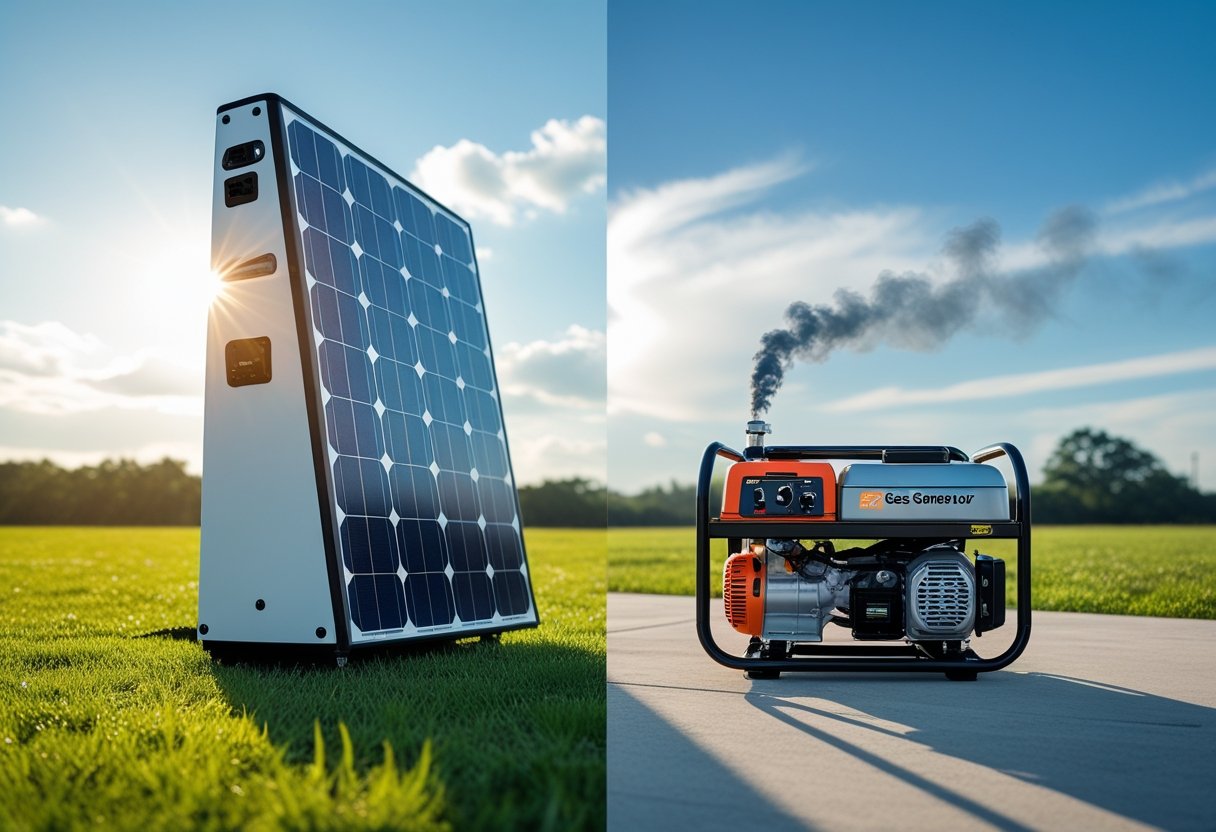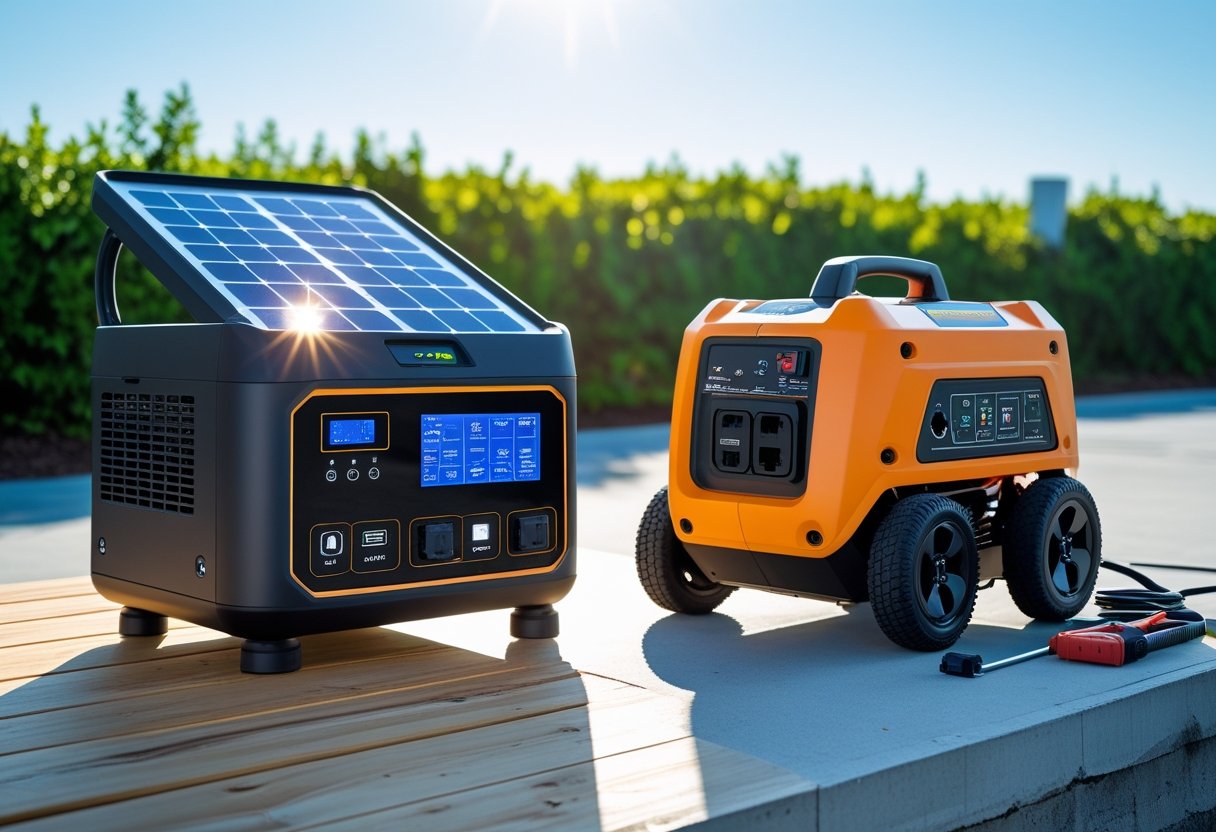Choosing between a solar generator and a gas generator depends on the user’s priorities, such as noise level, environmental impact, and fuel availability. Solar generators are generally better for quiet, low-maintenance, and environmentally friendly power needs, while gas generators provide higher power output and can run continuously as long as fuel is available.

Many people prefer solar generators for their sustainability and ease of use, especially in situations where clean energy and quiet operation matter. Gas generators, however, remain popular for heavy-duty or emergency scenarios due to their reliability and ability to quickly recharge batteries or power large appliances.
Understanding these differences helps users make a practical choice based on their situation, balancing convenience, cost, and long-term use. Those looking for more details on each option can find in-depth comparisons and testing results that clarify which generator suits specific needs best. See more on portable solar vs. gas generators for emergency power options.
Understanding Solar and Gas Generators
Both solar and gas generators convert energy into electricity but differ in how they source and store power. Each type has unique parts that determine how they operate, their portability, and maintenance needs. Knowing these details helps in choosing the right system for specific power requirements and conditions.
What Is a Solar Generator?
A solar generator uses solar panels to capture sunlight and convert it into electricity through solar power. This electricity charges a battery bank, often made of deep cycle batteries, which store energy for later use. It operates silently and produces zero emissions, relying entirely on renewable energy.
Solar generators are typically portable and ideal for outdoor use or emergency backup where clean energy is preferred. Their main limitation is dependence on sunlight, which means energy availability can vary with weather and time of day. Solar generators frequently include an inverter to convert stored DC power to AC power for standard appliances.
What Is a Gas Generator?
A gas generator is a portable generator that runs on fuel such as gasoline or propane. It creates electricity by burning fuel in an internal combustion engine, driving a mechanical generator. Gas generators can provide continuous power regardless of weather, making them reliable in diverse conditions.
They usually start quickly and have higher initial power output compared to solar generators of similar size. However, they produce engine noise, require fuel storage, and emit exhaust. Regular maintenance like oil changes and fuel management is also needed to ensure proper functioning.
Key Components of Each System
| Component | Solar Generator | Gas Generator |
|---|---|---|
| Energy Source | Solar panels capturing sunlight | Fuel tanks holding gasoline or propane |
| Power Storage | Battery bank with deep cycle batteries | No storage; continuous generation during operation |
| Energy Conversion | Inverter converts DC battery power to AC | Alternator converts mechanical energy to electricity |
| Noise Level | Silent operation | Engine noise present |
| Portability | Lightweight and easy to carry | Often heavier due to engine and fuel tank |
| Maintenance | Minimal; mainly battery care | Regular; engine oil, fuel filters, spark plugs |
Understanding these components shows how solar generators focus on clean, silent energy with battery storage, while gas generators emphasize continuous output using fuel combustion.
Performance and Efficiency Comparison
The key elements to consider include how much sustained power each generator can provide and the role of stored energy in maintaining output over time. Efficiency differences mainly arise from fuel dependency and energy storage capacity.
Power Output and Capacity
Gas generators usually provide higher peak power output. They can run appliances requiring substantial wattage, like large power tools or multiple household devices, without much reduction in performance.
Solar generators have lower power ratings but benefit from quiet operation and no fuel costs. Their capacity depends on solar panel size and battery bank capacity. Portable power stations with solar charging typically deliver between 200 to 2000 watts.
Because solar generators draw power from deep cycle batteries, their continuous output is limited by battery size and discharge rates. In contrast, gas generators can sustain high power as long as fuel is available, making them better suited for extended, heavy-load tasks.
Energy Storage and Battery Banks
Solar generators rely on built-in battery banks, often composed of deep cycle lithium or lead-acid batteries. These batteries store electricity converting solar power during the day for use anytime.
Battery capacity determines how long a solar generator can power devices without sunlight. Typical deep cycle batteries used in solar generators have cycle lives of several hundred to over a thousand cycles, meaning longevity aligns with usage patterns.
Gas generators provide electricity only when fuel is burning, offering no inherent energy storage. They cannot supply power if switched off or depleted fuel.
The ability to store energy makes solar generators more efficient for intermittent use. Users can recharge batteries off-grid or pre-charge during sunlight hours, ensuring power availability while avoiding fuel handling and emissions. For more detailed insights, review the comparison on solar vs gas generators for backup power.
Practical Considerations for Buyers

When choosing between solar and gas generators, buyers must assess factors like portability, fuel logistics, environmental impact, and product availability. Each aspect affects how well the generator fits specific needs, usage environments, and budgets.
Portability and Usage Scenarios
Portability varies significantly between solar generators and gas-powered units. Solar generators, often called portable power stations, are generally compact and lightweight, making them ideal for camping, tailgating, or small outdoor activities. Their silent operation allows use in noise-sensitive environments.
Gas generators, such as the Honda EU2000i, typically weigh more and are bulkier but offer higher power output, supporting larger appliances or tools. They suit scenarios requiring sustained, heavy-duty power, like construction sites or extended power outages. However, their size and weight can limit easy transport.
Buyers should consider where and how the generator will be used. Portable solar power stations favor mobility and quiet operation, while gas generators offer more power but less convenience for frequent relocation.
Fuel Availability and Cost
Fuel availability and ongoing expenses play a critical role in decision-making. Gas generators rely on gasoline or propane, which is widely accessible but involves fluctuating fuel prices. Users must store and handle fuel safely, and running costs accumulate over time.
Solar generators eliminate fuel costs entirely by harnessing sunlight, making their operational expense nearly zero after purchase. However, the upfront cost of solar units is typically higher due to battery packs and solar panels. Charging speed depends on sunlight availability or alternative AC hookups.
For long-term use in remote areas, fuel supply logistics for gas generators may pose challenges. Solar models require clear access to sunlight but sidestep fuel supply and price volatility.
Noise and Environmental Impact
Noise is a frequent restriction in residential or recreational use. Gas generators create noticeable sound, often exceeding 60 decibels, which can disturb neighbors or wildlife. Models like the Honda EU2000i are engineered to run quieter than older models but still produce sound during operation.
Solar generators operate silently since they have no moving parts. This makes them preferable in noise-sensitive settings and contributes to user comfort during extended use.
Environmentally, solar generators have zero emissions during operation. Gas units emit carbon dioxide and other pollutants, contributing to air quality degradation. Those concerned with reducing environmental impact typically favor solar options for clean energy.
Popular Models and Brands
Certain brands dominate the portable generator market based on reliability and user reviews. The Honda EU2000i is a benchmark gas-powered portable generator known for durability, quiet operation, and fuel efficiency. It produces around 2000 watts and suits medium-demand scenarios well.
In solar generators, brands like EcoFlow, Jackery, and Goal Zero lead with portable power stations that range from 100 watts to over 2000 watts of output. These units often include multiple USB, AC, and DC ports and feature fast charging capabilities.
When selecting a model, buyers should evaluate power needs, battery capacity, recharge methods, and warranty. Reading detailed product comparisons and user feedback can clarify which model fits specific applications best.
For more details on solar vs. gas generator power capacity and other comparisons, see solar generators vs gas generators.
Which Is Better: Solar Generator or Gas Generator?
Choosing between a solar generator and a gas generator depends on specific needs like power availability, fuel access, and usage patterns. Both options have distinct advantages related to their setup, fuel requirements, and maintenance demands.
Situational Recommendations
Solar generators excel in environments with consistent sunlight and where quiet, clean energy is preferred. They rely on solar panels and a battery bank to store energy, ideal for low to moderate power needs like charging devices or running small appliances. Solar generators perform best for extended use when refueling access is limited or fuel storage is impractical.
Gas generators provide reliable, high-power output better suited for situations requiring immediate, heavy loads or unpredictable power needs. They run on liquid fuel, which may be easier to source in emergencies. However, they require ventilation, fuel storage, and have louder operation, which can be a downside for some.
Long-Term Value and Maintenance
Solar generators usually have higher upfront costs due to solar panels and batteries but incur minimal ongoing expenses beyond occasional battery replacement. They need little maintenance except solar panel cleaning and battery health checks.
Gas generators cost less initially but demand regular maintenance like oil changes, fuel stabilization, and engine upkeep. The fluctuating price and storage concerns of fuel impact operating costs over time. Durability depends greatly on use and maintenance frequency.
Both systems can complement each other; a hybrid setup using solar panels to conserve gas generator fuel is often recommended for balanced performance (Reddit discussion).
Top Pick: Jackery Explorer 1000
Reliable, portable, and powerful — ideal for blackouts, camping, and off-grid living.
Check Price on Amazon →